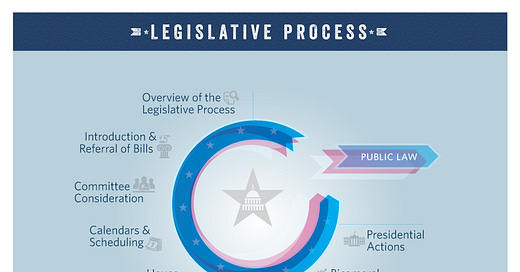#81: CIVICS 101: The Legislative Branch
Q&A #81: What are congressional standing committees and why are they necessary?
Our American Government
Our American Government is a small book published by the House of Representatives for citizens and those who seek a greater understanding of the American interpretation of democracy. It follows a question-and-answer format and covers a broad range of topics dealing with the three branches of our Government, the electoral process, and the role of political parties.
The Savvy Citizen is reproducing the 169 questions-and-answers through a series of posts called Civics 101. Each post will contain the Q&A as well as some additional commentary to add historical context, fun facts, or anything we believe will add to our collective understanding of these topics.
Think of it as your adult Civics class but without the test!
Let’s keep at it.
SECTION: The Legislative Branch: The Congress
The Committee System
Q&A #81: What are Congressional standing committees and why are they necessary?
Standing committees are permanent panels comprised of Members of a Chamber. Each panel has jurisdiction over measures and laws in certain areas of public policy, such as health, education, energy, the environment, foreign affairs, and agriculture.
Although Congress has used standing committees since its earliest days, it did not predominantly rely on them during its first quarter century. In these early years, legislative proposals were considered initially by all Members of one Chamber in plenary session; afterwards, each proposal was referred to a temporary, ad hoc committee responsible for working out a proposal’s details and making any technical changes. As the amount of legislative proposals increased, especially in certain subject areas, permanent committees replaced temporary ones for more expeditious screening and processing of legislation before its consideration by an entire Chamber.
Each Chamber now has its own standing committees, to allow it to consider many issues at the same time. Each committee selects, from the measures it receives each Congress, a relatively small number that merit committee scrutiny and subsequent consideration by the full Chamber.
Because of the small size of committees—and the often lengthy service of Members on the same panel—committees provide an effective means of managing Congress’s enormous workload and gaining expertise over the range and complexity of subjects with which the Government deals.
My Thoughts
As expected, Congress’ website—congress.gov—does a great job of explaining the committees in bothe House and Senate, their functions, and current activities. You can get an overview here.
You can get an overview of the legislative process, including Commitee Consideration, by watching a series of short videos here.
Back next time with a new section Q&A #82: What are the standing committees of the House?
Meanwhile, don’t forget that we’re organizing the post links on a single page available here.
xo,
Kelley for the Savvy Citizen Team
April 16, 2025




